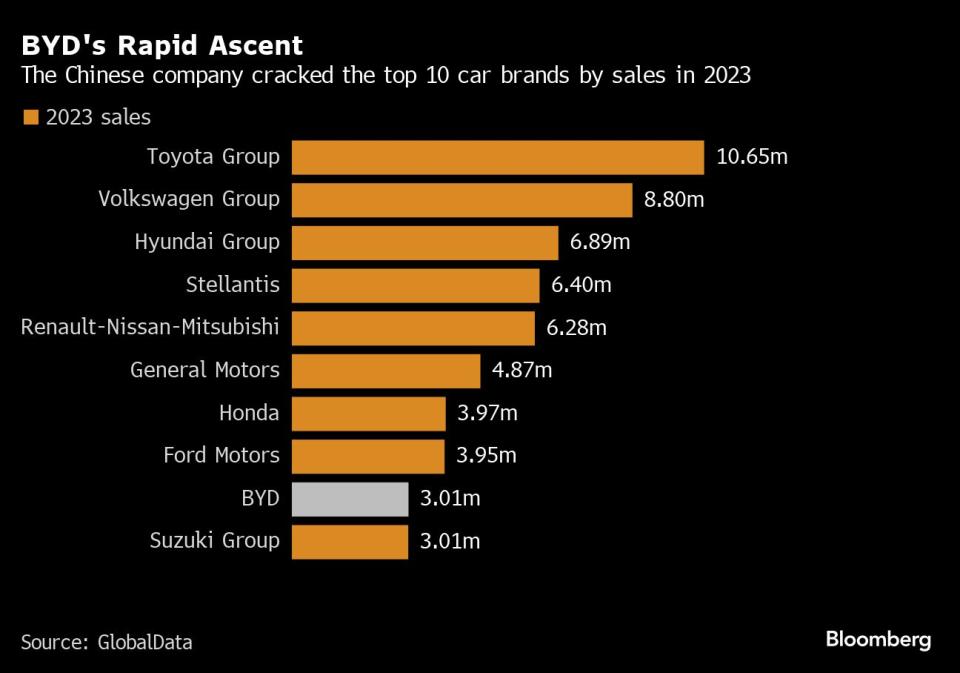BYD Targets 50% International Car Sales By 2030

Table of Contents
BYD's Electrification Strategy as a Cornerstone of International Growth
BYD's commitment to electrification is not just a strategy; it's the very foundation of its international expansion. The company's unwavering focus on electric vehicles (EVs) and plug-in hybrid electric vehicles (PHEVs) is a key differentiator in increasingly environmentally conscious global markets. This dedication is evident in several key areas:
-
Blade Battery Technology: BYD's proprietary Blade Battery technology offers superior energy density, improved safety, and a longer lifespan compared to traditional battery packs. This advantage is crucial for attracting international buyers concerned about range anxiety and battery longevity. The increased efficiency also contributes to lower overall vehicle costs.
-
Vertically Integrated Supply Chain: BYD's vertically integrated supply chain, encompassing everything from battery production to vehicle assembly, gives it a significant cost advantage and ensures greater control over quality and production timelines. This is vital for consistent delivery in competitive international markets.
-
Diverse EV Model Range: BYD offers a diverse range of EVs and PHEVs, catering to various market segments and consumer preferences. From compact city cars to larger SUVs, BYD provides options to suit different needs and budgets, maximizing its potential market reach.
-
Government Incentives and Subsidies: Leveraging government incentives and subsidies for EV adoption in various international markets is a crucial part of BYD's strategy. These incentives significantly reduce the purchase price for consumers, accelerating market penetration. BYD is adept at navigating and utilizing these government programs to maximize their impact.
Geographic Expansion Strategy: Key Markets and Partnerships
BYD's geographic expansion is multifaceted, focusing on strategically important regions:
-
Europe: Europe is a key target market due to its strong commitment to EV adoption and stringent emission regulations. BYD is actively establishing partnerships with local distributors and building a robust sales and service network.
-
North America: The North American market, while competitive, presents significant opportunities. BYD is focusing on building brand recognition and establishing a strong dealer network to compete effectively with established players.
-
Asia: Beyond its strong domestic market in China, BYD is expanding its presence in other Asian countries, leveraging existing relationships and adapting its vehicles to local preferences and regulatory frameworks.
The competitive landscape in each market is carefully analyzed. BYD employs localization strategies – adapting models to local tastes and regulatory requirements – and fosters collaborations with local distributors to ensure smooth market entry and efficient after-sales service. Challenges such as the development of sufficient charging infrastructure and addressing potential consumer perceptions about Chinese-made vehicles are actively being addressed.
Marketing and Branding Strategies for Global Reach
Building a strong global brand is paramount for BYD's success. Their strategies include:
-
Targeted Marketing Campaigns: BYD employs targeted marketing campaigns tailored to different demographics and cultural nuances in each market. Understanding local preferences is critical to their marketing approach.
-
Digital Marketing and Social Media: Leveraging digital marketing and social media platforms to reach wider audiences is a key element of their strategy. This allows for direct engagement with potential customers and effective brand-building.
-
Strategic Partnerships and Endorsements: While not heavily reliant on celebrity endorsements, BYD strategically partners with influencers and organizations aligned with its brand values to reach specific target groups.
-
Sustainability and CSR Initiatives: Highlighting sustainability and corporate social responsibility (CSR) initiatives is crucial in attracting environmentally conscious consumers in many international markets. This strengthens brand image and boosts customer loyalty.
Overcoming Challenges in Achieving the 50% Target
While BYD's strategy is ambitious and well-defined, several challenges could impact its ability to reach the 50% international sales target:
-
Supply Chain Disruptions: Global supply chain disruptions and potential resource limitations could affect production capacity and vehicle delivery timelines. Mitigating these risks through diversification and strategic partnerships is crucial.
-
Geopolitical Risks: Geopolitical instability and trade tensions could negatively impact operations in certain regions. BYD needs to be agile and adapt to changing geopolitical landscapes.
-
Intense Competition: The global automotive market is fiercely competitive. Established players and emerging EV brands pose significant challenges. Maintaining a competitive edge requires constant innovation and adaptation.
-
Regulatory Differences: Navigating different regulatory environments and emission standards across various countries requires careful planning and compliance efforts. This includes understanding and adhering to diverse safety and quality standards.
Conclusion
BYD's ambitious goal of achieving 50% international car sales by 2030 is a bold statement, showcasing its confidence in its electrification strategy, geographic expansion plans, and global marketing efforts. Their commitment to innovation, particularly with Blade Battery technology and their vertically integrated supply chain, provides a strong foundation. However, successfully navigating the complex challenges of global competition, geopolitical risks, and supply chain issues will be critical. Stay tuned for updates on BYD's continued global expansion and its impact on the future of the electric vehicle market. The journey of BYD international car sales is one to watch closely as it reshapes the global automotive landscape.

Featured Posts
-
 Undrafted Rookies Rise Threatens Established Aces
May 13, 2025
Undrafted Rookies Rise Threatens Established Aces
May 13, 2025 -
 Chris Browns Financial Backing Of Tory Lanezs New Album
May 13, 2025
Chris Browns Financial Backing Of Tory Lanezs New Album
May 13, 2025 -
 Ethan Slater In Elsbeth Season 2 Episode 17 A Character Analysis
May 13, 2025
Ethan Slater In Elsbeth Season 2 Episode 17 A Character Analysis
May 13, 2025 -
 Nea Foteina Gia Ton Megalo Kataklysmo Tis Mesogeioy Mia Istoriki Anaskopisi
May 13, 2025
Nea Foteina Gia Ton Megalo Kataklysmo Tis Mesogeioy Mia Istoriki Anaskopisi
May 13, 2025 -
 Dodgers Eye Next Mlb Luxury Free Agent Report Details Plans
May 13, 2025
Dodgers Eye Next Mlb Luxury Free Agent Report Details Plans
May 13, 2025
